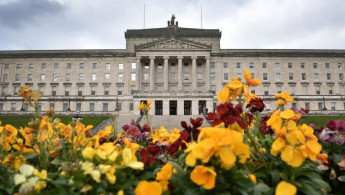Northern Ireland's DUP unionists oppose key part of Brexit trade deal
Northern Ireland's largest pro-UK party said on Monday they oppose a crucial part of a new post-Brexit trade pact for Belfast agreed by London and the European Union.
Democratic Unionist Party (DUP) leader Jeffrey Donaldson welcomed progress on the issue but said "the imposition of EU law" on Northern Ireland had not been resolved.
A vote in Britain's parliament on parts of the pact, which would give Northern Irish lawmakers an effective veto over new EU rules being imposed on Belfast, is due to take place on Wednesday.
The mechanism – referred to as the "Stormont brake" – was a key element in a landmark compromise announced by London and Brussels last month following months of negotiations.
The diplomatic wrangling had brought relations between Britain and the EU to a low ebb and unsettled Northern Ireland, nearly 25 years on from a historic peace deal that ended three decades of armed conflict.
It had been hoped the new agreement, dubbed the "Windsor Framework", would be accepted by all sides and help lead to the restoration of power-sharing in Belfast.
The DUP collapsed the devolved government last year over its opposition to the post-Brexit arrangements.
However, Donaldson said DUP lawmakers and officials had "unanimously agreed… that our members of parliament would vote against the draft statutory instrument on Wednesday".
The brake would allow Northern Ireland's devolved assembly to potentially block the application of new EU laws if a group of lawmakers in the devolved Stormont assembly formally petition over an objection.
It was designed to address concerns voiced by unionists, and Donaldson's party in particular, over what they had referred to as a "democratic deficit" in existing trade rules.
Under the "Northern Ireland Protocol" sealed in 2020, Northern Ireland is subject to some EU rules that do not apply elsewhere in the UK.
That protocol was aimed at avoiding the creation of a hard land border between Northern Ireland and the Republic of Ireland, which remains an EU member.
But it has angered pro-UK unionists who argue it threatens Northern Ireland's constitutional place within the UK.
The DUP's apparent opposition to the new proposals raises the prospect that the Stormont assembly will not be sitting during events in April to mark the 25th anniversary of 1998 peace accords, when US President Joe Biden is set to attend.





 Follow the Middle East's top stories in English at The New Arab on Google News
Follow the Middle East's top stories in English at The New Arab on Google News


